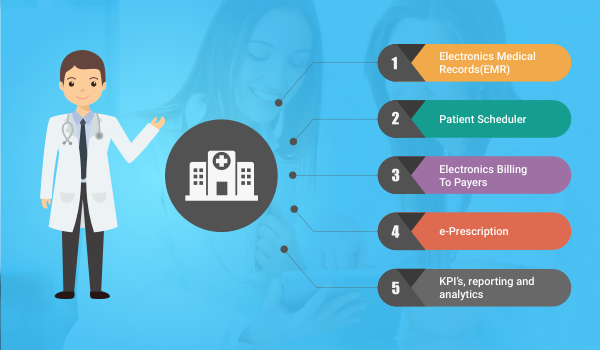Managing the patients and staff is the most important part of a hospital. A practice management system in healthcare (PMS) can efficiently manage several tasks like booking the appointments for patients, assigning them the respective doctors, paying the bills, saving patient’s reports, giving online prescriptions, etc. This will reduce the workload of your administrative staff and they can focus on various other tasks. For instance, one of the ways to book an appointment with the doctors in their available time slot is through patient scheduler software.
According to Statista, a popular online portal for statistics, the numbers of medical apps available on Google Play Store were 37,143 from 2015 to 2019 and these numbers are rising. Statista also estimates that by 2025, the market will grow to about 11 billion dollars. As per InformationWeek, a digital magazine, about 80% of doctors regularly use mobile phones and medical applications.
The reason for such a huge growth of mobile apps and systems in hospitals and healthcare is the efficiency of operations they provide. A mobile app is a very effective tool to captivate the users as well as streamline the functioning of the hospitals.
If you want to know how a medical app can help you to boost the functionality of your hospital, providing good service to patients have a look at the below points:
Patients’ Reports in Hand
There are specialized healthcare apps and systems available for saving all the reports and prescriptions of the patients online. These patient-centric systems are called EMRs or electronic medical records (EMR) systems. So, the patients don’t need to worry much about keeping the physical papers in hand or forgetting or misplacing them.
Also, using a PMS, the doctors can provide e-Prescription to patients in case of an emergency. Reports can be saved online and doctors of the same practice can access them at any time, from their desktops or smartphones.
Appointment Booking for Patients
A few years back, the patients had to wait in long queues or frequently call the receptionists to fix the appointments. However, today, there are some mobile apps which display the timeslots of the doctors and patients can book appointments sitting at their homes. This saves the time of both, the patients as well as the doctors. Such apps also send reminders to both patients and doctors, before the appointment, making the whole process hassle-free.
Convenient and Instant Payments of Bills
Bill payment in hospitals is another hectic process. Manual payment is not only time consuming, but also annoying at times. However, using mobile apps, bills can be paid immediately, cutting down the lengthy procedure of waiting in a queue to pay them. Today, billing to payers and mHealth apps have changed the traditional ways of payments. Also, the patient can have multiple payment options to pay and connect to their insurer, online through apps. It not only improves the billing experience of the patients but also helps customer relationship management (CRM).
Higher Efficiency with Practice Management System in healthcare
With proper management of patients and doctors, hospitals can ensure higher productivity. A practice management system in healthcare is a powerful way to automate certain activities like billing, tracking, etc., documenting and recording vital data and communicating with patients. These systems have all the data at a centralized system so that any doctor can avail their electronic medical records (EMR) and provide optimal solutions to them without wasting time. The doctors can pay attention to many patients in lesser time. There are some medical apps that enable doctor-patient communication, using the facility of sending messages, live chat, video calling, sharing images or files, etc. It helps to treat the patients from another location, in case of an emergency.
A HIPPA Complaint Medical App Increases Trust of Patients
HIPPA (Health Insurance Portability and Accountability Act) compliant apps ensure the protection of privacy and security of important data in the hospitals. It helps to reduce the errors in hospital processes, improves the quality of care to patients and increases the trust and satisfaction of the patients. Today, complying with HIPPA has been a top priority of every hospital.
Building Customer Loyalty
An efficient medical app can ensure the loyalty of the patients. When patients can fix the appointments sitting at home, when they can do instant payments with ease and when they could get treatment immediately in case of emergency, of course, they will choose your service. They will be loyal to you and even recommend to others.
Higher Productivity and Profits
Incorporation of PMS and advanced apps in the hospitals reduce various tasks of the doctors and enable high-quality service to patients. A hospital app helps in the effective management of tasks, setting clear goals for staff and monitoring their implementation to deliver better. Some apps also allow the patients to give feedbacks, which can be used to study customer behaviour. The flaws can be corrected to provide better service in the future. This ultimately increases the profits of the hospital.
Build Hospital Reputation
When your hospital has a digitally advanced app, it enables a positive patient experience, improving the hospital reputation. A mobile app also collects data about the patients, which is helpful in determining any shortcomings and applying patient-centric marketing strategies. It is a great way to entice patients.
Conclusion
A practice management system in healthcare or mobile health app makes all the operations in a hospital smoother to add value to the patients. There are many hospitals in the market that have already started using a personalized mobile app for themselves. Big hospitals, private clinics, training centres, dispensaries rehabilitation centres, etc. can be more efficient with the use of a dedicated mHealth app.


No comments:
Post a Comment